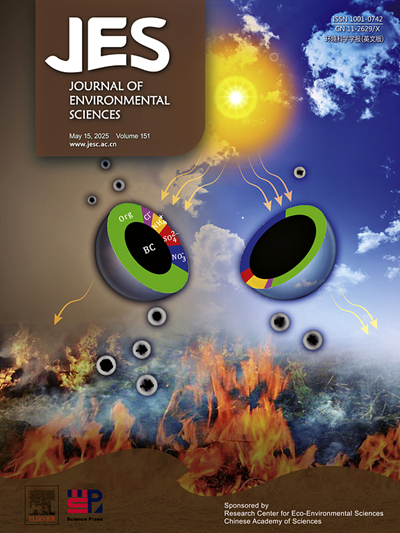热休克蛋白70减轻黑碳颗粒引起的心脏损伤
IF 5.9
2区 环境科学与生态学
Q1 ENVIRONMENTAL SCIENCES
引用次数: 0
摘要
研究表明,黑碳(BC)颗粒与心血管疾病风险升高之间存在关联。然而,这种关系背后的机制尚不清楚。本研究旨在探讨BC暴露对小鼠心肌基因表达的影响。将小鼠分为3组(磷酸缓冲盐水(PBS)组、C50组(50µg BC)和C100组(100µg BC)。采用RNA测序对心肌样本进行转录组分析。通过qRT-PCR验证候选基因的表达水平。采用Western Blot和免疫组化技术检测热休克蛋白70 (Hsp70)的表达。BC暴露可导致心脏I-1β和IL-6水平升高。转录组分析显示,与PBS组相比,C100组有1027个差异表达基因(DEGs)。基因本体(Gene Ontology, GO)富集分析表明,这些DEGs主要富集于错误折叠蛋白结合、呼吸链和ATP代谢过程中。此外,京都基因与基因组百科全书(KEGG)富集分析表明,DEGs在主要与朊病毒疾病、氧化磷酸化和活性氧相关的途径中显著富集。HSPA1A和HSPA1B作为Hsp70家族基因,在错误折叠蛋白结合和朊病毒疾病通路的GO项富集。此外,心脏Hsp70的表达在两组BC中均显著降低,并与促炎因子表达呈负相关。BC暴露已被证明会引起炎症性损伤,并可能诱导蛋白质错误折叠。值得注意的是,Hsp70是潜在的心脏保护因子和BC污染相关效应的靶点。本文章由计算机程序翻译,如有差异,请以英文原文为准。

Heat shock protein 70 mitigates black carbon particles-induced cardiac damage
Studies have demonstrated the association between black carbon (BC) particles and elevated risk of cardiovascular disease. However, the mechanisms underlying this relationship remain unclear. This study aims to investigate the effects of BC exposure on gene expressions in mice myocardium. Mice were divided into 3 groups (phosphate buffer saline (PBS) group, C50 group (50 µg BC) and C100 group (100 µg BC)). RNA sequencing was employed to conduct transcriptome analysis on myocardium samples. The expression levels of candidate genes were verified by qRT-PCR. Western Blot and Immunohistochemistry techniques were utilized to evaluate the expression of heat shock protein 70 (Hsp70). BC exposure can cause an increase in the level of cardiac I-1β and IL-6. Transcriptome analysis revealed 1027 differentially expressed genes (DEGs) in the C100 group compared with the PBS group. Gene Ontology (GO) enrichment analysis demonstrated that these DEGs were primarily enriched in misfolded protein binding, respiratory chain and ATP metabolic process. Additionally, Kyoto Encyclopedia of Genes and Genomes (KEGG) enrichment analysis indicated significant enrichment of DEGs in pathways mainly related to prion disease, oxidative phosphorylation and reactive oxygen species. HSPA1A and HSPA1B, as Hsp70 family genes, were enriched in GO term of misfolded protein binding and prion disease pathway. Moreover, the expression of cardiac Hsp70 was significantly decreased in both BC groups and showed a negative association with pro-inflammatory factors expression. BC exposure has been shown to cause inflammatory injury and may induce protein misfolding. Notably, Hsp70 was a potential cardioprotective factor and target for BC pollution-related effects.
求助全文
通过发布文献求助,成功后即可免费获取论文全文。
去求助
来源期刊

Journal of Environmental Sciences-china
环境科学-环境科学
CiteScore
13.70
自引率
0.00%
发文量
6354
审稿时长
2.6 months
期刊介绍:
The Journal of Environmental Sciences is an international journal started in 1989. The journal is devoted to publish original, peer-reviewed research papers on main aspects of environmental sciences, such as environmental chemistry, environmental biology, ecology, geosciences and environmental physics. Appropriate subjects include basic and applied research on atmospheric, terrestrial and aquatic environments, pollution control and abatement technology, conservation of natural resources, environmental health and toxicology. Announcements of international environmental science meetings and other recent information are also included.
 求助内容:
求助内容: 应助结果提醒方式:
应助结果提醒方式:


